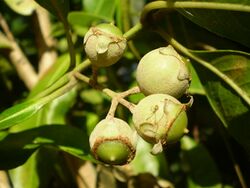Biology:Rhodomyrtus psidioides
| Rhodomyrtus psidioides | |
|---|---|

| |
| Scientific classification | |
| Kingdom: | Plantae |
| Clade: | Tracheophytes |
| Clade: | Angiosperms |
| Clade: | Eudicots |
| Clade: | Rosids |
| Order: | Myrtales |
| Family: | Myrtaceae |
| Genus: | Rhodomyrtus |
| Species: | R. psidioides
|
| Binomial name | |
| Rhodomyrtus psidioides (G.Don) Benth.
| |
| Synonyms | |
| |
Rhodomyrtus psidioides, the native guava, is a shrub or small rainforest tree up to 12 m (39 ft) high, member of the botanical family Myrtaceae, native to eastern Australia .[1]
Leaves are ovate to elliptic or oblong, 5–25 cm (2–10 in) long and 2.5–6.5 cm (1–3 in) wide, with a glossy upper surface and paler lower surface. Oil glands are numerous, and the leaves have a pineapple-like fragrance and stickiness when crushed. White or pink flowers occur in raceme-like inflorescences; followed by a berry, 15–25 mm (0.59–0.98 in) long, 10–15 mm (0.39–0.59 in) wide, yellow and fleshy.[2]
Uses
The berry of native guava is edible with a pleasant aromatic flavor. The tree is fast growing and has an important successional role in rainforest regeneration.
References
- ↑ Floyd, A.G. (1989). Rainforest Trees of Mainland South-eastern Australia. Inkata Press. ISBN 0-909605-57-2.
- ↑ Rhodomyrtus psidioides profile, Flora of NSW Online
Wikidata ☰ Q7321197 entry
 |

